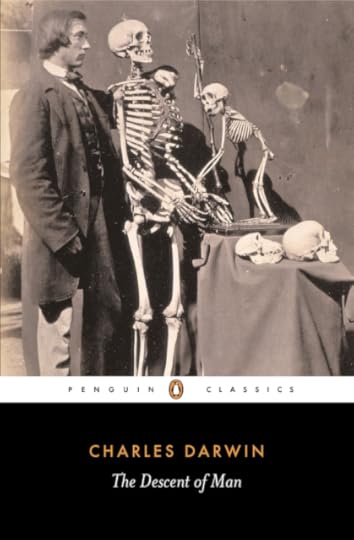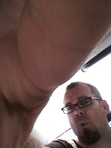Darwin (1871) on ants!
Darwin (1871) - on ants
Hey, check out this passage on ants (below), from:
 (Darwin 1871)
(Darwin 1871)
The legendary Charlie Darwin (1871, pp .185-89) writes:
Anyway... did you see the bold bit?
Ants are a lot like humans, in many ways. (i.e., They can be jerks too. See the `slaves' and `farming' bits.)
Anyway eusocial animals are crazy. But fascinating.
Anyway - I found it fascinating.
-----------------------------
You have been reading a blog-post by:
Dr J T Velikovsky
AI Researcher & Enthusiast& Evolutionary Culturologist
(and, also The StoryAlity Guy) aka Humanimal Transmedia Blog: On Writering
IMDb (Movies, Videogames): Music: Texas Radio & Zen Stupidity& Films about Bathurst...
etc etc. See On Writering and StoryAlity News .
---------//----------
Hey, check out this passage on ants (below), from:
 (Darwin 1871)
(Darwin 1871)The legendary Charlie Darwin (1871, pp .185-89) writes:
CHAPTER VI.
ON THE AFFINITIES AND GENEALOGY OF MAN.
Position of man in the animal series — The natural system genealogical — Adaptive characters of slight value — Various small points of resemblance between man and the Quadrumana — Rank of man in the natural system — Birthplace and antiquity of man — Absence of fossil connecting-links — Lower stages in the genealogy of man, as inferred, firstly from his affinities and secondly from his structure — Early androgynous condition of the Vertebrata — Conclusion.
EVEN if it be granted that the difference between man and his nearest allies is as great in corporeal structure as some naturalists maintain, and although we must grant that the difference between them is immense in mental power, yet the facts given in the previous chapters declare, as it appears to me, in the plainest manner, that man is descended from some lower form, notwithstanding that connecting-links have not hitherto been discovered.
Man is liable to numerous, slight, and diversified variations, which are induced by the same general causes, are governed and transmitted in accordance with the same general laws, as in the lower animals. Man tends to multiply at so rapid a rate that his off-spring are necessarily exposed to a struggle for existence, and consequently to natural selection. He has given rise to many races, some of which are so different that they have often been ranked by naturalists as distinct species. His body is constructed on the same homological plan as that of other mammals, independently of the uses to which the several parts may be put. He
P. 186 (starts below)
passes through the same phases of embryological development. He retains many rudimentary and useless structures, which no doubt were once serviceable. Characters occasionally make their re-appearance in him, which we have every reason to believe were possessed by his early progenitors. If the origin of man had been wholly different from that of all other animals, these various appearances would be mere empty deceptions; but such an admission is incredible. These appearances, on the other hand, are intelligible, at least to a large extent, if man is the co-descendant with other mammals of some unknown and lower form.
Some naturalists, from being deeply impressed with the mental and spiritual powers of man, have divided the whole organic world into three kingdoms, the Human, the Animal, and the Vegetable, thus giving to man a separate kingdom.1 Spiritual powers cannot be compared or classed by the naturalist; but he may endeavour to shew, as I have done, that the mental faculties of man and the lower animals do not differ in kind, although immensely in degree. A difference in degree, however great, does not justify us in placing man in a distinct kingdom, as will perhaps be best illustrated by comparing the mental powers of two insects, namely, a coccus or scale-insect and an ant, which undoubtedly belong to the same class. The difference is here greater, though of a somewhat different kind, than that between man and the highest mammal.
The female coccus, whilst young, attaches itself by its proboscis to a plant; sucks the sap but never moves again; is fertilised and lays eggs; and this is its whole history. On the other hand, to describe the habits and mental
1 Isidore Geoffroy St.-Hilaire gives a detailed account of the position assigned to man by various naturalists in their classifications: 'Hist. Nat. Gén.' tom. ii. 1859, p. 170-189.
p. 187
powers of a female ant, would require, as Pierre Huber has shewn, a large volume; I may, however, briefly specify a few points.
Ants communicate information to each other, and several unite for the same work, or games of play.
They recognise their fellow-ants after months of absence.
They build great edifices, keep them clean, close the doors in the evening, and post sentries.
They make roads, and even tunnels under rivers.
They collect food for the community, and when an object, too large for entrance, is brought to the nest, they enlarge the door, and afterwards build it up again.2
They go out to battle in regular bands, and freely sacrifice their lives for the common weal.
They emigrate in accordance with a preconcerted plan.
They capture slaves.
They keep Aphides as milch-cows.
They move the eggs of their aphides, as well as their own eggs and cocoons, into warm parts of the nest, in order that they may be quickly hatched; and endless similar facts could be given.
On the whole, the difference in mental power between an ant and a coccus is immense; yet no one has ever dreamed of placing them in distinct classes, much less in distinct kingdoms. No doubt this interval is bridged over by the intermediate mental powers of many other insects; and this is not the case with man and the higher apes. But we have every reason to believe that breaks in the series are simply the result of many forms having become extinct.
Professor Owen, relying chiefly on the structure of the brain, has divided the mammalian series into four sub-classes. One of these he devotes to man; in another he places both the marsupials and the monotremata; so that he makes man as distinct from all other mam-
2 See the very interesting article, "L'Instinct chez les Insectes," by M. George Pouchet, 'Revue des Deux Mondes,' Feb. 1870, p. 682.
p. 188
mals as are these two latter groups conjoined. This view has not been accepted, as far as I am aware, by any naturalist capable of forming an independent judgment, and therefore need not here be further considered.
We can understand why a classification founded on any single character or organ—even an organ so wonderfully complex and important as the brain—or on the high development of the mental faculties, is almost sure to prove unsatisfactory. This principle has indeed been tried with hymenopterous insects; but when thus classed by their habits or instincts, the arrangement proved thoroughly artificial.3
Classifications may, of course, be based on any character whatever, as on size, colour, or the element inhabited; but naturalists have long felt a profound conviction that there is a natural system. This system, it is now generally admitted, must be, as far as possible, genealogical in arrangement,—that is, the co-descendants of the same form must be kept together in one group, separate from the co-descendants of any other form; but if the parent-forms are related, so will be their descendants, and the two groups together will form a larger group. The amount of difference between the several groups—that is the amount of modification which each has undergone—will be expressed by such terms as genera, families, orders, and classes. As we have no record of the lines of descent, these lines can be discovered only by observing the degrees of resemblance between the beings which are to be classed. For this object numerous points of resemblance are of much more importance than the amount of similarity or dissimilarity in a few points. If two languages were found to resemble each other in a multitude of
3 Westwood, 'Modern Class. of Insects,' vol. ii. 1840, p. 87.
p. 189
words and points of construction, they would be universally recognised as having sprung from a common source, notwithstanding that they differed greatly in some few words or points of construction. But with organic beings the points of resemblance must not consist of adaptations to similar habits of life: two animals may, for instance, have had their whole frames modified for living in the water, and yet they will not be brought any nearer to each other in the natural system.
Hence we can see how it is that resemblances in unimportant structures, in useless and rudimentary organs, and in parts not as yet fully developed or functionally active, are by far the most serviceable for classification; for they can hardly be due to adaptations within a late period; and thus they reveal the old lines of descent or of true affinity.'
(Darwin 1871, pp. 185-9)
Anyway... did you see the bold bit?
Ants are a lot like humans, in many ways. (i.e., They can be jerks too. See the `slaves' and `farming' bits.)
Anyway eusocial animals are crazy. But fascinating.
Anyway - I found it fascinating.
-----------------------------
You have been reading a blog-post by:
Dr J T Velikovsky
AI Researcher & Enthusiast& Evolutionary Culturologist
(and, also The StoryAlity Guy) aka Humanimal Transmedia Blog: On Writering
IMDb (Movies, Videogames): Music: Texas Radio & Zen Stupidity& Films about Bathurst...
etc etc. See On Writering and StoryAlity News .
---------//----------
Published on October 08, 2019 11:28
No comments have been added yet.



